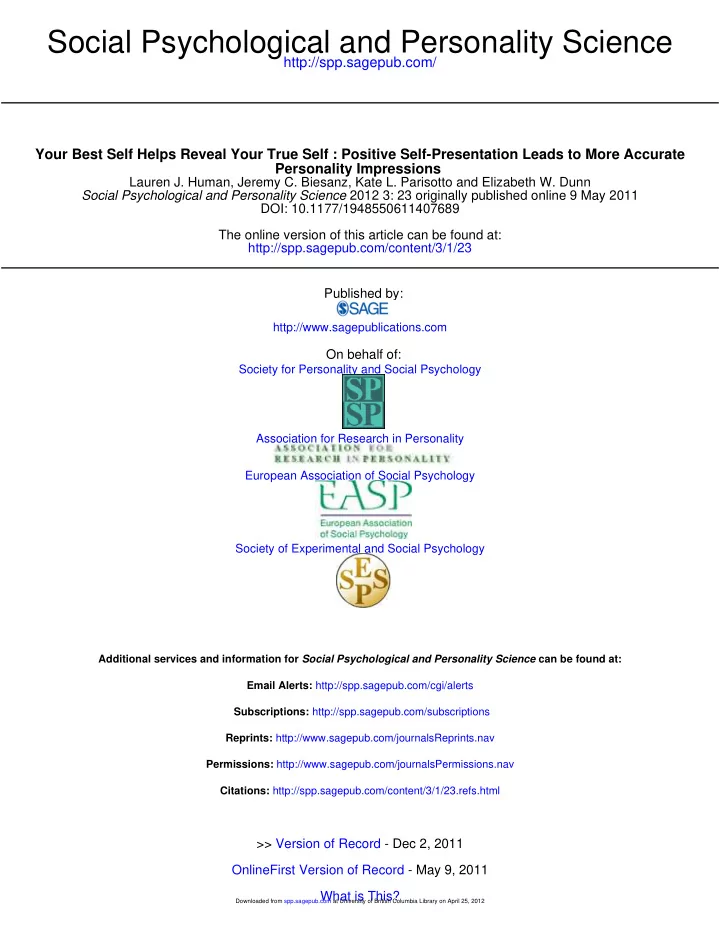

Social Psychological and Personality Science http://spp.sagepub.com/ Your Best Self Helps Reveal Your True Self : Positive Self-Presentation Leads to More Accurate Personality Impressions Lauren J. Human, Jeremy C. Biesanz, Kate L. Parisotto and Elizabeth W. Dunn Social Psychological and Personality Science 2012 3: 23 originally published online 9 May 2011 DOI: 10.1177/1948550611407689 The online version of this article can be found at: http://spp.sagepub.com/content/3/1/23 Published by: http://www.sagepublications.com On behalf of: Society for Personality and Social Psychology Association for Research in Personality European Association of Social Psychology Society of Experimental and Social Psychology Additional services and information for Social Psychological and Personality Science can be found at: Email Alerts: http://spp.sagepub.com/cgi/alerts Subscriptions: http://spp.sagepub.com/subscriptions Reprints: http://www.sagepub.com/journalsReprints.nav Permissions: http://www.sagepub.com/journalsPermissions.nav Citations: http://spp.sagepub.com/content/3/1/23.refs.html >> Version of Record - Dec 2, 2011 OnlineFirst Version of Record - May 9, 2011 What is This? Downloaded from spp.sagepub.com at University of British Columbia Library on April 25, 2012
Social Psychological and Personality Science Your Best Self Helps Reveal Your 3(1) 23-30 ª The Author(s) 2012 Reprints and permission: True Self: Positive Self-Presentation sagepub.com/journalsPermissions.nav DOI: 10.1177/1948550611407689 Leads to More Accurate Personality http://spps.sagepub.com Impressions Lauren J. Human 1 , Jeremy C. Biesanz 1 , Kate L. Parisotto 1 , and Elizabeth W. Dunn 1 Abstract How does trying to make a positive impression on others impact the accuracy of impressions? In an experimental study, the impact of positive self-presentation on the accuracy of impressions was examined by randomly assigning targets to either ‘‘put their best face forward’’ or to a control condition with low self-presentation demands. First, self-presenters successfully elicited more positive impressions from others, being viewed as more normative and better liked than those less motivated to self- present. Importantly, self-presenters were also viewed with greater accuracy than control targets, being perceived more in line with their self-reported distinctive personality traits and their IQ test scores. Mediational analyses were consistent with the hypothesis that self-presenters were more engaging than controls, which in turn led these individuals to be viewed with greater distinctive self–other agreement. In sum, positive self-presentation facilitates more accurate impressions, indicating that putting one’s best self forward helps reveal one’s true self. Keywords accuracy, self–other agreement, self-presentation, person perception, first impressions Man is least himself when he talks in his own person. Give him (Leary, 1995; Schlenker & Pontari, 2000). This is likely due to a mask, and he will tell you the truth. the potential negative interpersonal consequences of one’s –Oscar Wilde deception being discovered—for instance, people respond nega- tively to those whose actions differ from their words (Schlenker Individuals attempt to make positive impressions on others & Leary, 1982). Further, deceiving others may have negative in a range of social situations, from job interviews to first dates. personal consequences to one’s sense of authenticity, which Interestingly, the very situations where individuals try the hard- seems to be a primary motive for many people (Swann, Pelham, est to impress are those where accurate impressions are most & Krull, 1989). Indeed, even in online social networks and critical to the perceiver. Although traditionally and intuitively, web pages, where people are undoubtedly self-presenting, they self-presentation has ‘‘evoked images of superficiality rather provide others with valid cues to their personalities and allow than substance, and deception rather than authenticity’’ them to form accurate impressions (Back et al., 2010; Vazire (Schlenker & Pontari, 2000, p. 199), day-to-day positive self- & Gosling, 2004). At the same time, self-presentation attempts presentation may not hinder the accuracy of first impressions in first impressions are also often successful in that people are of personality but may actually enhance it. able to elicit the desired impression from others (e.g., Murphy, Self-presentation is the goal-directed process of controlling 2007; Paulhus, 1998), indicating that accuracy and positive bias information about the self to influence others’ impressions may coexist when self-presentation occurs. This is possible (Baumeister, 1982; Goffman, 1959; Schlenker, 1980). In posi- tive self-presentation, the aim is to make a good impression on 1 Department of Psychology, University of British Columbia, Vancouver, BC, others, through emphasizing one’s positive traits and minimizing Canada one’s negative traits. In the current study, we are particularly interested in positive self-presentation without deception, which Corresponding Author: is likely typical of most day-to-day self-presentation attempts. In Lauren J. Human, Department of Psychology, University of British Columbia, fact, self-presentation is often described as involving the dual 2136 West Mall, Vancouver, BC, Canada V6T 1Z4 goals of making a good impression while remaining authentic Email: lhuman@psych.ubc.ca Downloaded from spp.sagepub.com at University of British Columbia Library on April 25, 2012
Recommend
More recommend